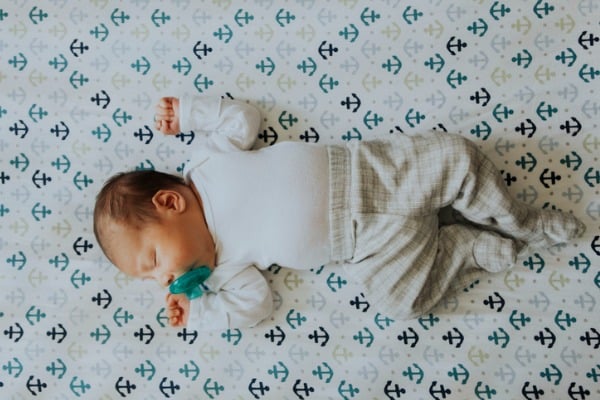By 2 months your baby can stay up significantly longer than they did when they were first born, but they still require at least 4-5 hours of sleep throughout the day. Following the correct 2 month wake window will set your baby up for success, preventing them from getting over tired.
Table of Contents
- Understanding the 2 month awake window to prevent an overtired baby
- How long should a 2 month old wake window be?
- How you can promote healthy sleep habits at 2 months old
- 2 month old sleep schedule
- FAQs
Understanding the 2 month awake window to prevent an overtired baby

Following an age-appropriate wake window helps prevent your 2 month old baby from getting over tired.
Many parents wonder if 2 months old is too early to start thinking about putting their baby on a schedule, but actually between 6-12 weeks is the perfect time to start implementing a schedule.
Your baby’s biological clock begins to form during this time, so it’s a good idea to have their internal time match up with their daily schedule.
A baby’s biological clock is controlled by two hormones, cortisol and melatonin, which rise and fall throughout the day. Wake windows match up with your baby’s fluctuating melatonin and cortisol levels during the day, ensuring your baby has the best possible chance of going to sleep at specific times throughout the day.
How long should a 2 month old wake window be?
Baby’s awake window is 1.5 hours at this age. Now, there is a range, and typically babies that are tinier will be tired sooner than babies that are packing on the pounds fairly quickly.
When I’m talking about a range though, especially with this age, it’s not a large range, but rather a 15-20 minute span that might be appropriate for 2 month olds depending on their sleep needs and size.
Where we run into issues is when parents of a 2 month old tell me that their baby needs to go to sleep after only an hour or an hour, ten minutes, then I can easily see that’s outside of the normal range and we need to investigate why that is.
When you put a baby to bed using a wake window that’s too short typically the baby will happily go down for the nap but then they’ll wake up after one sleep cycle (45 minutes). Short naps encourage over tiredness, often derailing an entire day.
The same can be said about putting a baby to bed using a wake window that’s too long. Not only will they likely wake up only after one sleep cycle, they will be a terror to put down because they’ll be overtired at that point.
Babies are not like adults! When adults are super tired they can hit the pillow and be out. With babies, the more well rested they are, the longer the nap and you can also expect better night sleep.
How you can promote healthy sleep habits at 2 months old

While sleep training isn’t developmentally appropriate at 2 months, there are so many things you can do to help promote healthy sleep habits. Following these guidelines from a young age goes a long way towards helping baby overcome the various sleep regressions in the first couple years of life.
Swaddling
Swaddling your baby is so beneficial in making sure that they get the rest they need. The moro (startle) reflex is present for the first few months of your baby’s life and babies that aren’t swaddled will frequently wake up due to the reflex.
An arms-down swaddle is what I recommend for parents, as an arms-up swaddle is helpful, but not to the same extent as the arms-down swaddle. Once baby starts showing signs of rolling the swaddle should be dropped.
White noise
A white noise machine helps to block out external noises that may wake up your baby. Once baby is 2 months, they no longer can sleep whenever, wherever, so setting up a quiet sleep environment is key. White noise also tends to remind them of the womb, which is never fully quiet!
Blackout curtains
Those first few weeks babies are still high off of mom’s melatonin, but soon that wears off and by weeks 6-8 your baby will start to make their own sleep hormones. Melatonin, the sleep hormone, is only produced in the darkness.
Placing your baby to sleep in a pitch black room will really go a long way towards helping them get off to sleep quickly. Gone are the days when your baby can sleep in the living room in full sun!
Watch for sleepy cues
You want to watch the clock to keep an eye on the wake window and pay close attention to your baby’s sleepy cues as to when it’s time to put them to bed. Here is what to look for:
- Decreased activity
- Slower motions, less vocal/social
- Not interested in toys/people as much
- Yawning
- Redness around eyebrows or eyes
When you see your baby whining, fussing or pulling at their ears they’re actually entering into the overtired stage.
Carry out a bedtime routine
A consistent bedtime routine that baby can count on will help cue them in to the fact that it’s time to sleep. You want this to be about 10-15 minutes and it needs to be very low stimulation.
A quiet walk around the house followed by books, diaper change, and a couple of songs is a great way to let baby know it’s time to settle down and go to sleep.
You want to do the bedtime routine within the wake window, so because this wake window is 1.5 hours, you’ll start the wind down routine at one hour, fifteen minutes.
2 month old baby sleep schedule & nap schedule

Here’s an easy to follow 2 month old sleep schedule following the awake time of 1.5 hours:
- 7:00am awake & feed
- 8.30 am nap
- 10 am awake
- 10.30 & 11am feed and top off feed
- 11.30 am nap
- 2.15 pm awake
- 2.30 pm feed
- 3:45 pm nap
- 4:45 pm awake and feed
- 5.30pm bath
- 6.15pm feed and bed
The double feed right before the lunch time nap helps to promote a long, restorative nap. Night sleep can be challenging to come by at this time, and often times a an awake feed at 10pm ish often helps babies sleep until 3 or 4 am.
The nap schedule for the 2 month old baby is 8:30, 11:30 and 3:45. Your baby’s naps will vary based on how long they sleep and how well they sleep. You may have to adjust the schedule accordingly.
The biggest thing here is to put them down at the age-appropriate wake window so they don’t get overtired and potentially develop a second wind of energy.
Frequently asked questions
What’s the best morning wake up time?
Following your baby’s natural hormone fluctuations, the best wake up time is between 7 and 7:30 am. If you let your baby sleep in, their real-life schedule isn’t syncing with their internal body clock, making naps and nighttime much harder.
How to achieve the last nap of the day
The last nap of the day can be challenging and so I typically recommend to parents that you do an assisted nap for this one if you’re having trouble getting baby to go down. Some babies go down beautifully for this nap, while others need assistance.
Take baby on a walk or a nap on mom are both good options here. You really just want to prevent over tiredness and allow baby to make it to bedtime without being exhausted. If the last nap of the day falls apart, you need to move up bedtime.
How long should naps be?
Ideally you want the first nap to be 2 sleep cycles (1.5 hours) and the second nap of the day to be 2-3 sleep cycles, but preferably 3. The second daytime nap is the most important, and I do encourage parents to have this nap at home to encourage a longer sleep period. The length of time of the last nap varies, but you at least want to aim for 30 minutes here.
What’s a good bedtime?
Most parents are shocked to find out that babies aged 2 months should be going to bed between 6 and 6:30. This is when baby’s cortisol levels have naturally dropped off and when melatonin is peaking.
You need to also keep in mind the wake window here too. If baby had a horrible last nap of the day, you’ll need to move bedtime up to make sure that they’re down by the wake window.
What’s the best way to settle a baby this age?
At this age, using either Harvy Karp’s 5s or the shush/pat settling method really helps to calm upset babies.
The 5 S’s are:
- Swaddling
- Side position
- Shusing
- Swining
- Sucking
Should my baby be sleeping through the night now?
Night waking is common at this age and typically babies do not sleep through the night at this age and usually they are at least waking for two night feedings between 7pm-7am. Once babies reach 14 pounds it is possible for them to wake just once for a feed between 7pm-7am.
How many night feeds should my baby be having?
Most babies have at least 2-3 night feeds at 2 months of age.
How many hours of sleep does my baby need at this age?
Babies need between 11-12 hours of sleep at night and 4-5 hours of daytime sleep. This means in a 24 hour period your baby is likely sleeping 15-16 hours in a day!
Find more wake windows by age here.

Leave a Reply